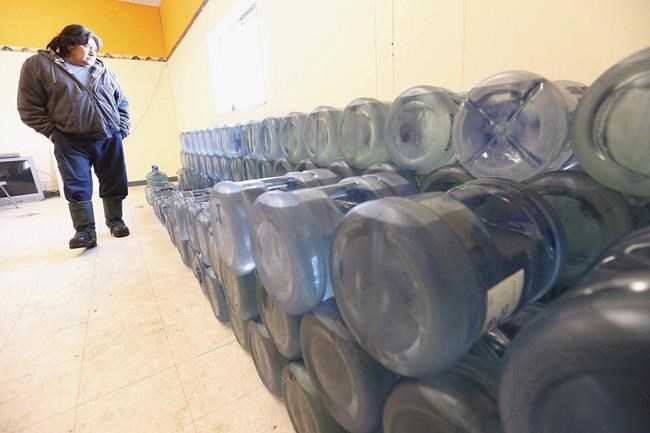An $8-billion class-action settlement on First Nations drinking water due to be ratified next week still isn't clear on who it will cover, says a lawyer involved with the issue.Â
Clayton Leonard, who represents several Alberta bands that have filed their own drinking water lawsuits, said Wednesday he's getting conflicting answers from the Justice Department and federal lawyers who worked on the deal.
"Who are the members of the class?" he asked. "Who gets left behind?
"There are still lots of things that don't seem to have a sense of clarity or fairness around them."
In July, the federal government reached an agreement in principle on an out-of-court settlement for a class-action lawsuit brought over the lack of clean, safe, drinking water in First Nations communities.Â
The agreement includes $1.5 billion in compensation for people deprived of clean drinking water, $400 million for a First Nations economic and cultural restoration fund, and at least $6 billion to support reliable access to safe drinking water on reserves.
The class action, brought by Tataskweyak Cree Nation in Manitoba and the Curve Lake and Neskantaga First Nations in Ontario, included all First Nations people whose communities were subject to a drinking water advisory for at least a year starting on Nov. 8, 1995.
The settlement is scheduled for a ratification hearing Tuesday in parallel hearings in Federal Court and Manitoba Court of Queen's Bench.
But Leonard points out the settlement could exclude a lot of First Nations. Some bands, he said, solved their own problem or had water advisories that didn't meet the one-year advisory threshold.
"Why a year?" he asked. "There might have been 30 in a year that were six months long and were lifted because a First Nation took its own steps to respond."
Others have had recurring short-term water problems, he said.
"Sometimes they're seasonal, during high turbidity levels in the spring, but when you look at the big picture it's a compelling story of chronic drinking water problems. Doesn't match the class, but it tells the same story.Â
"Why are those nations being left behind?"
Leonard said federal officials have told him the $6 billion is for all First Nations, but federal lawyers who negotiated the deal have told him it's only for members of the class action.Â
Leonard said the settlement is also ambiguous on which advisories are counted. It's not clear if they have to be Health Canada advisories, provincial advisories or advisories issued by band councils.Â
He said he's aware of at least five court actions against the federal government on drinking water, including two brought by his clients, that won't be settled by the class action.
Spokespeople from Indigenous Services Canada or the Assembly of First Nations, which supported the class action, were not immediately available for comment.
Leonard said the confusion stems from using a class-action lawsuit to settle an issue that should have been addressed through legislation.Â
It has been estimated the settlement will affect 120 First Nations across Canada.
A government website says there remain 43 water advisories in 31 First Nations communities. Since 2015, 119 such advisories have been lifted. Â
In 2011, a national engineering assessment estimated the cost of bringing all First Nations water systems up to Canadian standards would be $4.9 billion over 10 years.Â
In a report tabled Wednesday, Parliamentary Budget Officer Yves Giroux said the government has set aside more than enough money to meet the expected capital costs to build water and wastewater systems over the next five years but needs to fund training programs to run and maintain the systems.Â
This report by The Canadian Press was first published Dec. 1, 2021.
— Follow Bob Weber on Twitter at @row1960
Bob Weber, The Canadian Press

